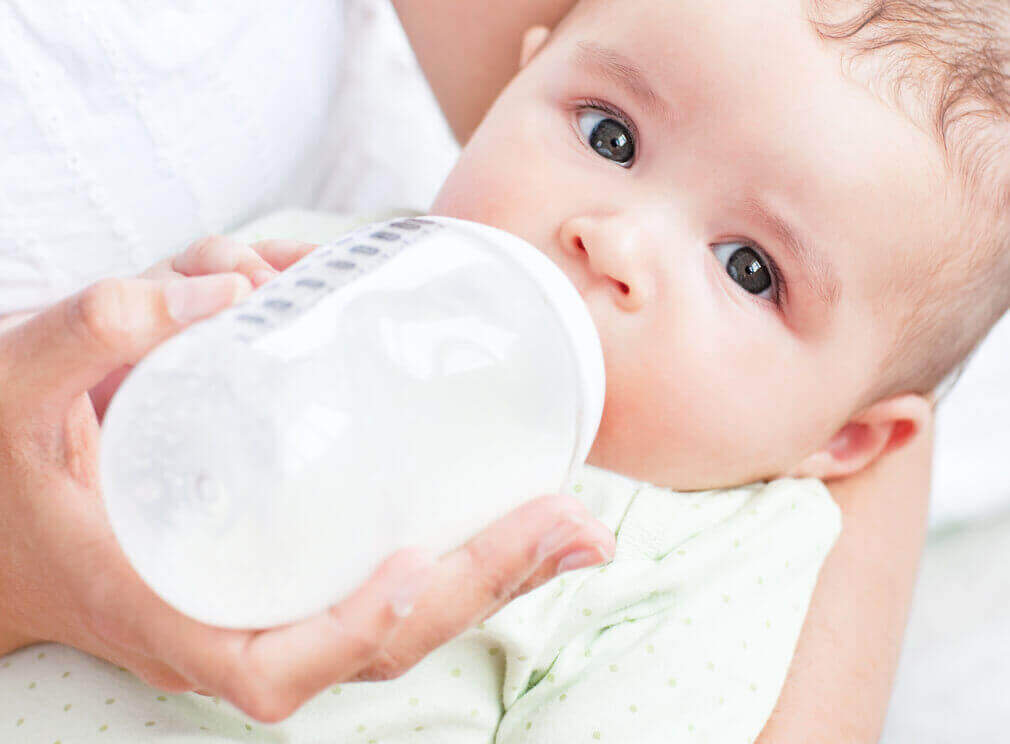What to Do If Your Baby Doesn't Want to Take a Bottle

What do I do if my baby doesn’t want to take a bottle? This is a very common question among mothers who want to stop breastfeeding or supplement it.
This transition can be complicated. Therefore, you surely want to find a way to cause as little trauma as possible, both for the parents and the baby.
Your doctor or other maternity expert may recommend that you give your baby a bottle after he or she turns one month old. In this period, generally mothers go back to their job after maternity leave. Therefore, they won’t be available to breastfeed as much as before.
However, weaning your baby off completely can cause some issues. The best thing is to alternate breastfeeding with formula. That way, your baby can get all the nutrients he needs from breastmilk, then with formula as a good addition.
It’s very important to add formula milk to your baby’s diet little by little. Then, your baby will be less likely to reject it.
Always remember that your pediatrician should always supervise the process of changing your baby’s diet. He’ll tell you the right formula and handle any reactions that may happen.
Why won’t my baby take a bottle?
Newborn babies enjoy and demand a lot of physical contact with their mother. When they don’t have it, they get stressed out and cry.
This closeness makes them feel protected and safe. By adding a change that gives them less skin-to-skin contact, they might feel rejection.
The feel, texture, and sucking technique are completely different from what they already know. Therefore, rejection is completely normal.

Changing your baby’s diet from breast milk to formula is what could make your baby reject it. He might not like the formula’s taste, texture, smell, or the way his body reacts to it.
Since it’s such a long and delicate process, patience plays a very important role. Your baby will feel incomplete and strange by having a new food and tool to eat. Therefore, we’ll give you some tips on how to make this transition easier.
Free discovery
Let your baby discover the bottle, hold it in his hands, and bite the nipple. Introducing it to him first will definitely make it easier for him to adjust.
To help even more, add a few drops of breast milk. That way, he can have something a little familiar in there.
Make him feel warm
When feeding, we recommend hugging him and wrapping him in something that smells like his mother when someone else is feeding him.
You can talk to him in a soft and soothing voice so he feels safe. In addition, having someone bottle feed him from the beginning will help with the weaning process.
“The best thing is to alternate breastfeeding with formula. That way, your baby can get all the nutrients he needs from breastmilk, then with formula as a good addition.”
Make your baby feel relaxed
Having the baby in a good position while rocking him back and forth will turn eating into a relaxing moment. Therefore, you’ll help your baby associate bottles with relaxation.
Acceptance
Your baby won’t get used to having to take a bottle immediately or overnight. Therefore, you must have lots of patience.
Also, don’t force your baby if he cries or rejects it. Don’t get upset and go back to only breastfeeding at the first sight of rejection. It takes time to get your baby to take a bottle.
A good method to speed up this process is by placing the nipple close to his mouth and rubbing it on his lips instead of forcing it into his mouth. Always use the same bottle and techniques when feeding him.

Temperature
The temperature of the formula is very important. It shouldn’t be too hot or too cold. A good trick is to dip the nipple in water. This way, it could make it more pleasant for your baby to eat from.
If you’re one of the mothers saying, “My baby doesn’t want to take a bottle,” keep a good attitude and be patient while trying to get your child to adjust.
It’s important to stay calm and not get frustrated. Weaning is a slow process that can have many ups and downs. Some mothers even get depressed when they feel like they failed.
Don’t forget to follow these tips to make the process easier. Also, consult a specialist to recommend the best food for your baby.
Remember, breast milk has all of the necessary nutrients for your child. When looking for a substitute, you need to follow your doctor’s recommendations.
What do I do if my baby doesn’t want to take a bottle? This is a very common question among mothers who want to stop breastfeeding or supplement it.
This transition can be complicated. Therefore, you surely want to find a way to cause as little trauma as possible, both for the parents and the baby.
Your doctor or other maternity expert may recommend that you give your baby a bottle after he or she turns one month old. In this period, generally mothers go back to their job after maternity leave. Therefore, they won’t be available to breastfeed as much as before.
However, weaning your baby off completely can cause some issues. The best thing is to alternate breastfeeding with formula. That way, your baby can get all the nutrients he needs from breastmilk, then with formula as a good addition.
It’s very important to add formula milk to your baby’s diet little by little. Then, your baby will be less likely to reject it.
Always remember that your pediatrician should always supervise the process of changing your baby’s diet. He’ll tell you the right formula and handle any reactions that may happen.
Why won’t my baby take a bottle?
Newborn babies enjoy and demand a lot of physical contact with their mother. When they don’t have it, they get stressed out and cry.
This closeness makes them feel protected and safe. By adding a change that gives them less skin-to-skin contact, they might feel rejection.
The feel, texture, and sucking technique are completely different from what they already know. Therefore, rejection is completely normal.

Changing your baby’s diet from breast milk to formula is what could make your baby reject it. He might not like the formula’s taste, texture, smell, or the way his body reacts to it.
Since it’s such a long and delicate process, patience plays a very important role. Your baby will feel incomplete and strange by having a new food and tool to eat. Therefore, we’ll give you some tips on how to make this transition easier.
Free discovery
Let your baby discover the bottle, hold it in his hands, and bite the nipple. Introducing it to him first will definitely make it easier for him to adjust.
To help even more, add a few drops of breast milk. That way, he can have something a little familiar in there.
Make him feel warm
When feeding, we recommend hugging him and wrapping him in something that smells like his mother when someone else is feeding him.
You can talk to him in a soft and soothing voice so he feels safe. In addition, having someone bottle feed him from the beginning will help with the weaning process.
“The best thing is to alternate breastfeeding with formula. That way, your baby can get all the nutrients he needs from breastmilk, then with formula as a good addition.”
Make your baby feel relaxed
Having the baby in a good position while rocking him back and forth will turn eating into a relaxing moment. Therefore, you’ll help your baby associate bottles with relaxation.
Acceptance
Your baby won’t get used to having to take a bottle immediately or overnight. Therefore, you must have lots of patience.
Also, don’t force your baby if he cries or rejects it. Don’t get upset and go back to only breastfeeding at the first sight of rejection. It takes time to get your baby to take a bottle.
A good method to speed up this process is by placing the nipple close to his mouth and rubbing it on his lips instead of forcing it into his mouth. Always use the same bottle and techniques when feeding him.

Temperature
The temperature of the formula is very important. It shouldn’t be too hot or too cold. A good trick is to dip the nipple in water. This way, it could make it more pleasant for your baby to eat from.
If you’re one of the mothers saying, “My baby doesn’t want to take a bottle,” keep a good attitude and be patient while trying to get your child to adjust.
It’s important to stay calm and not get frustrated. Weaning is a slow process that can have many ups and downs. Some mothers even get depressed when they feel like they failed.
Don’t forget to follow these tips to make the process easier. Also, consult a specialist to recommend the best food for your baby.
Remember, breast milk has all of the necessary nutrients for your child. When looking for a substitute, you need to follow your doctor’s recommendations.
All cited sources were thoroughly reviewed by our team to ensure their quality, reliability, currency, and validity. The bibliography of this article was considered reliable and of academic or scientific accuracy.
- Binns, C., Lee, M., & Low, W. Y. (2016). The long-term public health benefits of breastfeeding. Asia Pacific Journal of Public Health, 28(1), 7-14. https://journals.sagepub.com/doi/abs/10.1177/1010539515624964
- Abreu, L. G., Paiva, S. M., Pordeus, I. A., & Martins, C. C. (2016). Breastfeeding, bottle feeding and risk of malocclusion in mixed and permanent dentitions: a systematic review. Brazilian oral research, 30(1). https://www.scielo.br/scielo.php?pid=S1806-83242016000100401&script=sci_arttext
This text is provided for informational purposes only and does not replace consultation with a professional. If in doubt, consult your specialist.








